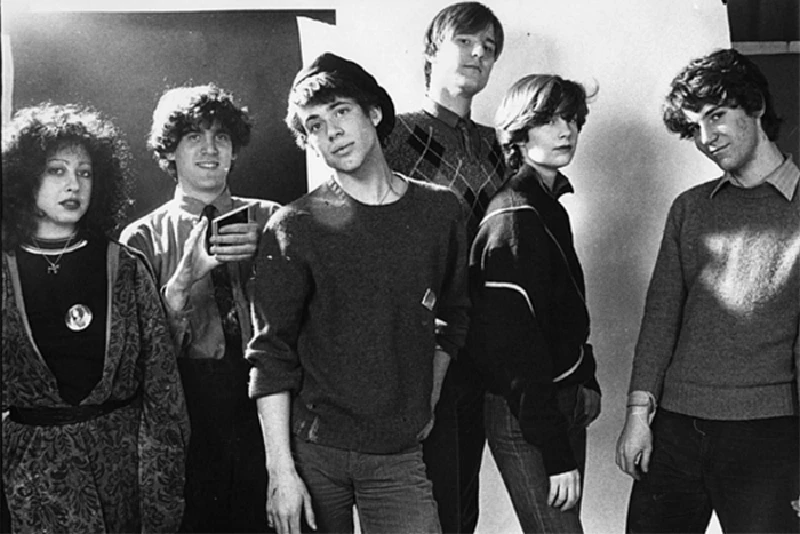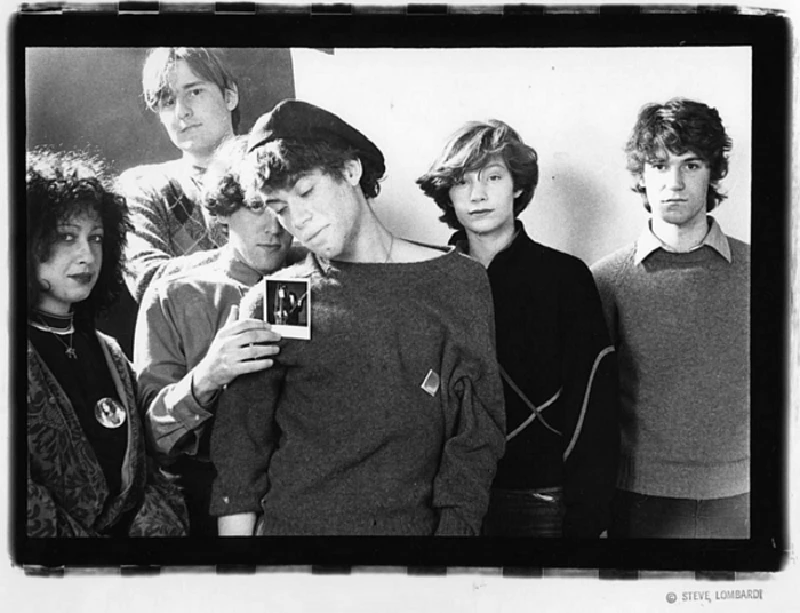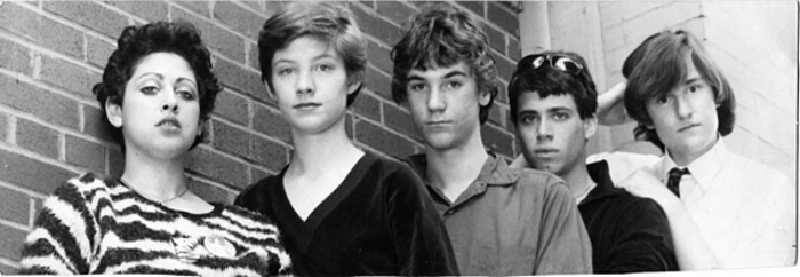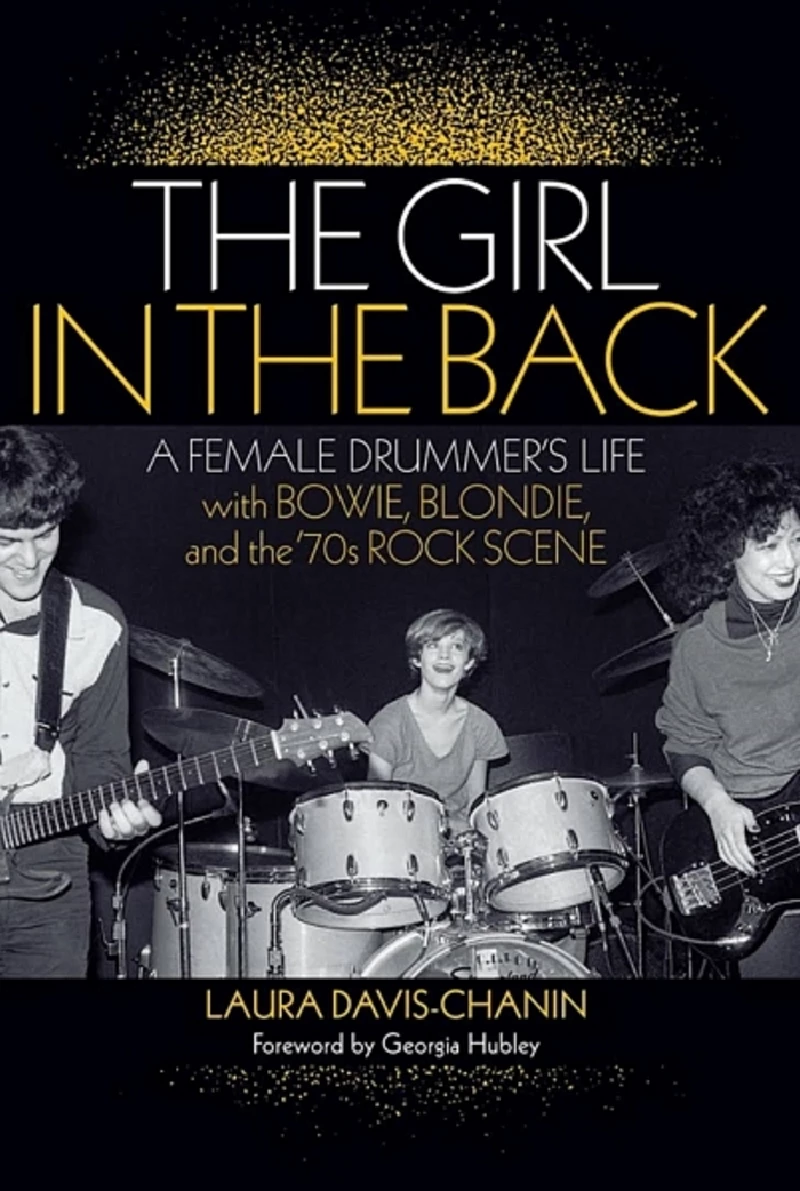Laura Davis-Chanin - Interview
by John Clarkson
published: 9 / 8 / 2018

intro
Laura Davis-Chanin speaks to John Clarkson about her new book 'The Girl in the Back', which is a memoir of her 70's New York new wave band the Student Teachers and also Blondie and David Bowie.
There have been several books published in the wake of his death in January 2016 about David Bowie. Some have been decade-spanning accounts of his musical career; others have been more personal memoirs focusing on Bowie at a particular place and time. None of these, however, have caught the human side of ‘The Man Who Fell to Earth’ and ‘Starman’ as well as Laura Davis-Chanin’s new book, ‘The Girl in the Back’. Davis-Chanin (or Davis as she was then) was the drummer in New York-based teenage new wave outfit, the Student Teachers. The Student Teachers, whom Davis joined when she was a sixteen-year old high school student, formed in 1978, and also consisted of David Scharff (vocals), Philip Shelley (guitar), Bill Arning (keyboards), Lori Reese (bass) and latterly Joe Katz (second guitar). They released, during Davis’ time in the band, a single, ‘Christmas Weather/Channel 13’, on Terry Ork’s influential label ORK Records, and two tracks, ‘Looks’ and ‘What I Can’t Feel’, on ‘2 X 5’, a five band compilation which came out on Red Star Records, the record label of former New York Dolls manager, Marty Thau. The Student Teachers broke up on Halloween night 1980, but Davis had already left, having been fired from the group some months beforehand. Subtitled ‘A Female Drummer’s Life with Bowie, Blondie and the ‘70s Rock Scene’, ‘The Girl in the Back’ is a vivid account of the Student Teachers’ rise from enthusiastic audience members at legendary New York rock clubs such as CBGB’s and Max’s Kansas City to supporting their favourite bands to becoming a headline act. As Lori Reese describes it in the sleeve notes to ‘Invitation to…The Student Teachers’, a compilation of their music, which emerged in 2013, “As fans we decided to start a band in order to get closer to the musicians. As kids without jobs we started a band so we could get into the clubs for free.” Davis’ reason for wanting to join the band was both more simple and yet more complex. “It wasn’t that I wanted to make music per se, but I did want to make music with my close friends,” she explains on the same set of sleeve notes. Her background, while middle class, was dysfunctional. Her parents had broken up when she and her sister were young. The girls had initially lived with their mother in Virginia, but when she developed alcohol and mental issues custody for them was taken away from her, and their father reluctantly took them in to stay with him in the large SoHo loft that he lived in with his younger second wife. The work-obsessed art critic for ‘Newsweek’, he wanted little to do with his daughters, either being too heavy-handed in his approach to disciplining them or more regularly neglectful, pushing them out into the streets for hours at a time so that he could focus on his work. “The Student Teachers was like being in a surrogate family for me,” Davis-Chanin elaborates in a transatlantic phone call with Pennyblackmusic to talk about ‘The Girl in the Back’. “It evolved for me because my own family had fallen apart. Everybody else in the band needed it as well, however, because their families were also falling apart or they weren’t in touch with their family.” What is in some ways shocking about ‘The Girl in the Back’ is the lack of adult influence upon the lives of the young band. Both David Schorff and Philip Shelley live twenty miles outside New York in vast houses in the commuter town of Larchmont. When Davis is kicked out by her father permanently after staying out all night with a musician in another band on the scene, she is taken in by Shelley, who lets her stay in his room for a fortnight, but she never sees his parents or is even aware if they know that she is there. She and the slightly older Reese eventually are lent a small basement flat in New York through the mother of the small girl Davis babysits for, but it quickly becomes a doss house for punk rockers and other youngsters with absent parental figures. “It is remarkable that we were able to do what we did,” reflects Davis-Chanin, “but at that period in time it was not unusual. It wasn’t just the guys in the band. Bill, who was the keyboard player, still lived at home. He had a relationship with his parents. It was just that they weren’t stopping him. It was the same with the other guys’ parents. I don’t know if it was a reaction that parents were having at that time, maybe to having coming out of the 1960s, but for some reason there were a lot of people of my age at the time or maybe in some cases a year or two younger whose parents were not very involved with them.” The Student Teachers quickly get caught up in a late night lifestyle of hard drug-taking, drinking and excessive partying, all while most of its members are still at school. “I take a quote from Patti Smith about freedom at the start of ‘The Girl in the Back’”, says Davis-Chanin, “which is ‘To me, punk rock is the freedom to create, freedom to be successful, freedom to be who you are.’ We were, however, too young for that freedom. I see ‘The Girl in the Back’ as being very much about the loss of innocence. We had to grow up faster than one should grow up.” After being briefly romantically involved with Shelley, Davis starts to go out with the much older Jimmy Destri, the keyboardist and one of the main songwriters in Blondie, who she meets first of all at Max’s Kansas City. When the basement let comes to an abrupt end, Davis moves briefly back with her reluctant father, but she soon moves out again with his encouragement to live with Destri. Her father is so eager for to stay away that, when her school pulls her up for being constantly late and because it is against the law for their students not to be living at home, he lies to the principal, telling her that she has moved back there. “I don’t know why he was the way that he was,” recollects Davis-Chanin, who now has two grown-up daughters of her own. “He was certainly obsessed with his work. Kicking us out probably served his purpose more than trying to work with us.“ “I am not saying that having teenagers is easy,” she says, before adding simply, “There are some people, however, that shouldn’t be parents.” Destri proves to be initially supportive of Laura. He is encouraging of the Student Teachers. In the process of carving out for himself a secondary career as a producer, he is largely instrumental in setting up the record deals with ORK and Red Star Records and produces both the tracks for the ‘Christmas Weather’ single and the compilation. He is also a heavy cocaine user. As his drug dependence increases, he becomes more possessive of Davis. He hits her, and on two occasions forces himself on her sexually. “I don’t know if he has read the book” says Davis-Chanin about Destri, who has been for some years in recovery and now does work as a substance abuse therapist. “I will be surprised though if he hasn’t. We have not been in contact for many years. I have, however, remained in touch with Debbie Harry and Chris Stein from Blondie, and they both love the book.“ “I know that Jimmy doesn’t come out well in it,” she admits. “He was, however, very much under the weight of his drug use. Cocaine has a quality that makes you very hyper-energetic and it also fuels your anger. Even though he was involved in all this intense drug use, he was writing these phenomenal songs at the time both with Blondie and on his own, and I ask the question in ‘The Girl in the Back’ as well if that is what you need to do in order to write phenomenal songs? I sometimes think that is true.” Davis first saw David Bowie as a fourteen-year old at her first ever gig at Madison Square Garden in 1976 on his ‘Station to Station’ tour, and she meets him for the first time three years later in the late summer of 1979 at a party at Harry and Stein’s apartment. He is in New York to record ‘Scary Monsters (and Super Creeps)’, and, during the year she knows him, later returns there to star in a production of ‘The Elephant Man’ on Broadway. He also does some work with Destri, them both performing together on the prime-time television show, ‘Saturday Night Live’. At the height of fame, and unable to go out for fear of being mobbed, he lives an elusive existence. Meetings with him are often clandestine, taking place in in the back rooms of restaurants and in hidden, secret apartments. He, however, becomes a good friend to Laura, attending a Student Teachers rehearsal and then a gig at CBGB’s, organising a support slot for them with Iggy Pop, and helping to build bridges with her father by meeting him to talk about his own intensive knowledge of art. His own infamous battle with drugs in the mid-70’s largely behind him, he is, with Debbie Harry, one of the few responsible adult figures in the book. “You couldn’t avoid when you were him the difficult experience of what I call ‘living in the bubble’,” Davis-Chanin recalls. “You couldn’t really walk down the street with him, but my experience with him was nevertheless very human and very real. I really wanted to show that side of him. These people that we see as our idols are human also, which in a way is unfortunate but which is the reality. He was a real humanist, and an incredibly kind human being.“ Laura suddenly starts to see things in double vision which hampers her last gig with the Student Teachers, and two days later she is sacked by them, who, frustrated with her at missing several rehearsals, feel that she has drifted away from them as she has been drawn into Destri’s world. She puts her sight problems down initially to drinking too much and her own use of cocaine, but is diagnosed with multiple sclerosis and is hospitalised. While her vision eventually returns, she finds herself in limbo, her health fragile, disillusioned by the rock world, and, while she has scraped a high school graduation, unsure of where to go with her life. In her last meeting with Bowie in September 1980, she has tried modelling but realised that it is not for her. He advises her to listen to herself and asks what she really wants. She admits to him that she would like to go to college. He tells her that she doesn't have to be rock and roll and to follow herself. "I think getting diagnosed with MS when I did kind of saved me," reflects Davis-Chanin. "Being young and inside the 'bubble' of high-powered rock n roll found me not emotionally strong enough to move where I really wanted to go which was out of rock and roll and back to education. So, the diagnosis I think helped that for me." "But even more importantly when David supported and encouraged me to go to college and said to me, 'You don’t have to be here', that was and is a hugely powerful thing for a teenager to hear from a rock and roll icon such as David Bowie. That, alone, helped and moved me more than anything else." Davis left Jimmy Destri a few months later in late 1980. They got back briefly together the following year, but broke up again. She started at New York University later that year, studying writing and eventually becoming a lawyer. She was out of contact with the other Student Teachers after she left the band in early 1980 for many years, but reconnected with them at the time the ‘Invitation to…The Student Teachers’ compilation came out in 2013. All six other members of the band have contributed their thoughts and brief anecdotes on the band to 'The Girl in the Back'. In a remarkable coda at the end of 'The Girl in the Back', the night after the gig with Iggy Pop, some of the Student Teachers have gathered at Destri and Laura's apartment with Bowie also present. There is a telephone call from a representative from the major label RCA wanting to sign them. Destri, who has answered the phone, asks Bowie what he thinks, and Bowie, who is the midst of his own intensive legal battle with RCA and shortly afterwards will leave them to sign to EMI, tells him not to let them do it as RCA will rip them off. Destri puts the phone down abruptly on the representative and rings off. "We might have lasted a little longer," says Davis-Chanin in conclusion when asked what might have happened to the Student Teachers if the RCA deal had come off. "It is distinctly possible that we could have had a hit. I say that because Philip Shelley, who wrote 'Looks', which I think is our most popular song really had it in him, to write a hit. He is very talented, so I think that is possibly what would have happened if we had gone through with the RCA thing. Would we have lasted as a band though? Would I have stayed? I doubt it because I think I always knew deep down in my heart and in my soul that I wanted to be in academia and go to college, so I doubt I would have stayed but I might have stayed a bit longer. When you get some degree of success in rock and roll there is always drugs and alcohol and there are parties all the time, and if the group has signed to RCA there would have been more parties and more drugs. That would have probably brought us down too. I think we would have probably lasted a little bit longer, but I don't think we would have lasted very long though." Davis-Chanin is currently working on two other books, and co-writing the autobiography of Michael Alago, the record company executive who signed Metallica to Elektra Records in 1984, as well writing her debut novel which is a fictionalised account of her and her mother's relationship. 'The Girl in the Back' provides new insight into the 70's New York punk and new wave scene, David Bowie and Blondie, and is one of the most important rock memoirs of the year. The top photograph was taken by Steve Lombardi and the bottom photograph by Joe Stevens.
Band Links:-
http://laurakdc.com/https://en-gb.facebook.com/LDavisChanin/
https://twitter.com/laurakdc18
https://www.thestudentteachers.com
Play in YouTube:-
Picture Gallery:-



most viewed articles
current edition
Carl Ewens - David Bowie 1964 to 1982 On Track: Every Album, Every SongArmory Show - Interview with Richard Jobson
John McKay - Interview
Colin Blunstone - Thalia Hall, Chicago, 16/7/2025
Billie Eilish - O2 Arena, London, 10/7/2025
Bathers - Photoscapes 1
Visor Fest - Valencia, Spain, 26/9/2025...27/9/2025
Loft - Interview
Sir Tim Rice - Interview
Robert Forster - Interview
previous editions
Manic Street Preachers - (Gig of a Lifetime) Millennium Stadium, Cardiff, December 1999Heavenly - P.U.N.K. Girl EP
Beautiful South - Ten Songs That Made Me Love...
Oasis - Oasis, Earl's Court, London, 1995
Peter Perrett - In Dreams Begin Responsibilities Interview Part One
Boomtown Rats - Ten Songs That Made Me Love....
Coldplay - Wembley Arena. London, 16/8/2022
Prolapse - Interview
Pixies - Ten Songs That Made Me Love...
Trudie Myerscough-Harris - Interview
most viewed reviews
current edition
Davey Woodward - Mumbo in the JumboSick Man of Europe - The Sick Man of Europe
Lucy Spraggan - Other Sides of the Moon
Amy Macdonald - Is This What You've Been Waiting For?
Phew, Erika Kobayashi,, Dieter Moebius - Radium Girls
Bush - I Beat Loneliness
Suzanne Vega - Flying With Angels
Alice Cooper - The Revenge of Alice Cooper
Blueboy - 2
Cynthia Erivo - I Forgive You
Pennyblackmusic Regular Contributors
Adrian Janes
Amanda J. Window
Andrew Twambley
Anthony Dhanendran
Benjamin Howarth
Cila Warncke
Daniel Cressey
Darren Aston
Dastardly
Dave Goodwin
Denzil Watson
Dominic B. Simpson
Eoghan Lyng
Fiona Hutchings
Harry Sherriff
Helen Tipping
Jamie Rowland
John Clarkson
Julie Cruickshank
Kimberly Bright
Lisa Torem
Maarten Schiethart